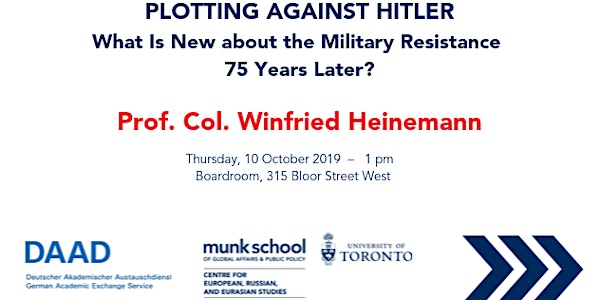
Plotting against Hitler: 75 Years Later
Prof. Col. Winfried Heinemann will discuss the failed assassination plot against Hitler that took place on 20 July 1944.
Date and time
Location
Munk School of Global Affairs and Public Policy
315 Bloor Street West Boardroom Toronto, ON M5S 0A7 CanadaAbout this event
On the occasion of the 75th anniversary of the failed coup d’état against Hitler on 20 July 1944, there has been a considerable surge of publications on the topic. Some such books, at times by amateur historians, have focused on the personality of Stauffenberg, the mastermind behind the conspiracy and the man who planted the bomb. Was he driven by religious and ethical motives, by his allegiance to the circle around esoteric author Stefan George, or was he motivated by purely military considerations?
Winfried Heinemann argues that, in the same way the political resistance was influenced by Weimar-era thought, so too were the military conspirators shaped by their experience in the Reichswehr (Army of the Weimar Republic). He will place the revolt in the context of the Third Reich’s polycratic structures, and explain how that in turn prevented the postwar West German Bundeswehr (Federal Armed Forces) from identifying too easily with the conspirators.
Winfried Heinemann was born in Dortmund and studied history and English language at Bochum University and King’s College, London. From 1983 to 2018, he served as an officer in the German Army. Since 1986, he was attached to the German Armed Forces ‘ Centre for Military History in Freiburg, later in Potsdam. After taking his PhD with a thesis on the early diplomatic history of NATO, he went on to direct the East German Military History branch, then the departments for research and for historical education. He retired as the Chief of Staff and Deputy Commander of the Centre.
Gavin Wiens (commentator) completed his PhD in the Department of History at the University of Toronto in 2019. His dissertation argued that the German army remained a decentralized, contingent-based institution between the Wars of Unification and the end of the First World War and that the distribution of military power among Germany’s lesser kings, grand dukes, and princes played a crucial role in legitimizing and perpetuating monarchical rule during a period of rapid economic and social change. He has published essays on the composition and operations of the German army during the First World War and he has held grants and fellowships from the Social Sciences and Humanities Research Council of Canada, the German Academic Exchange Service (DAAD), the Central European History Society, the German Historical Institute, Washington, DC, and the Anne Tanenbaum Centre for Jewish Studies at the University of Toronto. His current research focuses on the activities of German military attachés and advisors in Africa, Asia, the Middle East, and South America between the Napoleonic Wars and the end of the Cold War.
This event is co-financed by the DAAD with funds from the German Federal Foreign Office (AA).